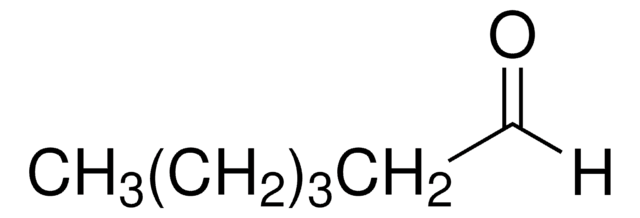W271500
Methyl laurate
≥98%, FG
Synonym(s):
Lauric acid methyl ester, Methyl dodecanoate
About This Item
Recommended Products
biological source
synthetic
Quality Level
grade
FG
Fragrance grade
Halal
Agency
follows IFRA guidelines
meets purity specifications of JECFA
reg. compliance
EU Regulation 1223/2009
EU Regulation 1334/2008 & 872/2012
FDA 21 CFR 172.515
Assay
≥98%
refractive index
n20/D 1.431 (lit.)
bp
262 °C/766 mmHg (lit.)
mp
4-5 °C (lit.)
density
0.87 g/mL at 25 °C (lit.)
application(s)
flavors and fragrances
Documentation
see Safety & Documentation for available documents
food allergen
no known allergens
fragrance allergen
no known allergens
Organoleptic
coconut; creamy; fatty; soapy
SMILES string
CCCCCCCCCCCC(=O)OC
InChI
1S/C13H26O2/c1-3-4-5-6-7-8-9-10-11-12-13(14)15-2/h3-12H2,1-2H3
InChI key
UQDUPQYQJKYHQI-UHFFFAOYSA-N
Looking for similar products? Visit Product Comparison Guide
General description
Application
- Frustrated Lewis pair catalyst realizes efficient green diesel production.: Methyl laurate is employed as a key reactant in the development of an efficient and environmentally friendly catalyst system for the production of green diesel. This breakthrough offers a sustainable alternative to traditional diesel production methods (Li et al., 2024).
- Sodium phosphate solid base catalysts for production of novel biodiesel by transesterification reaction.: This paper explores the use of sodium phosphate solid base catalysts in the transesterification of methyl laurate to produce biodiesel. The research demonstrates high efficiency and novel catalyst design, contributing to advancements in sustainable fuel production (Zhao et al., 2023).
Signal Word
Warning
Hazard Statements
Precautionary Statements
Hazard Classifications
Aquatic Acute 1 - Aquatic Chronic 2
Storage Class Code
10 - Combustible liquids
WGK
WGK 2
Flash Point(F)
282.2 °F - closed cup
Flash Point(C)
139 °C - closed cup
Personal Protective Equipment
Choose from one of the most recent versions:
Already Own This Product?
Find documentation for the products that you have recently purchased in the Document Library.
Customers Also Viewed
Our team of scientists has experience in all areas of research including Life Science, Material Science, Chemical Synthesis, Chromatography, Analytical and many others.
Contact Technical Service







